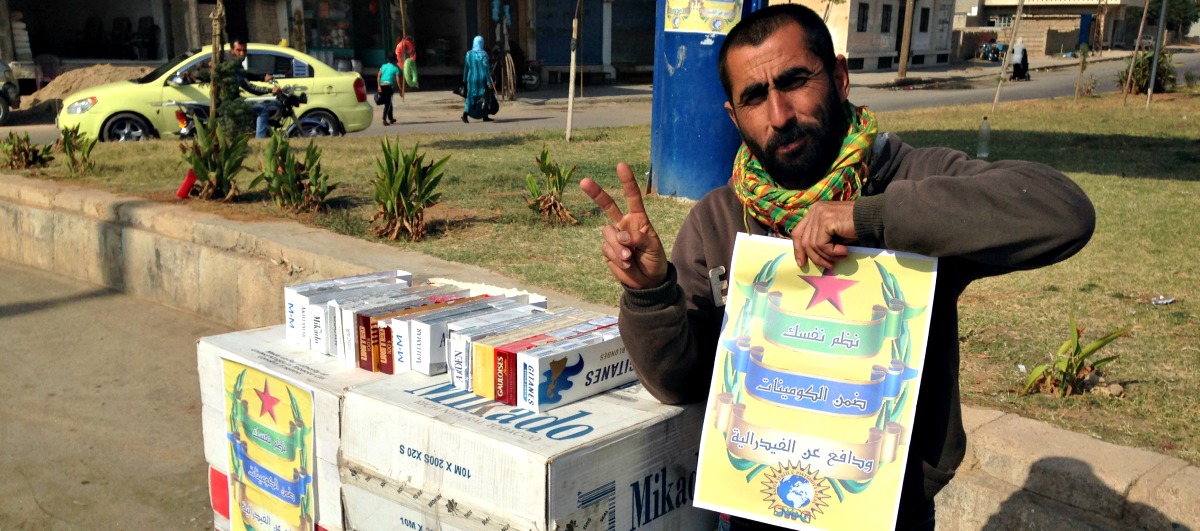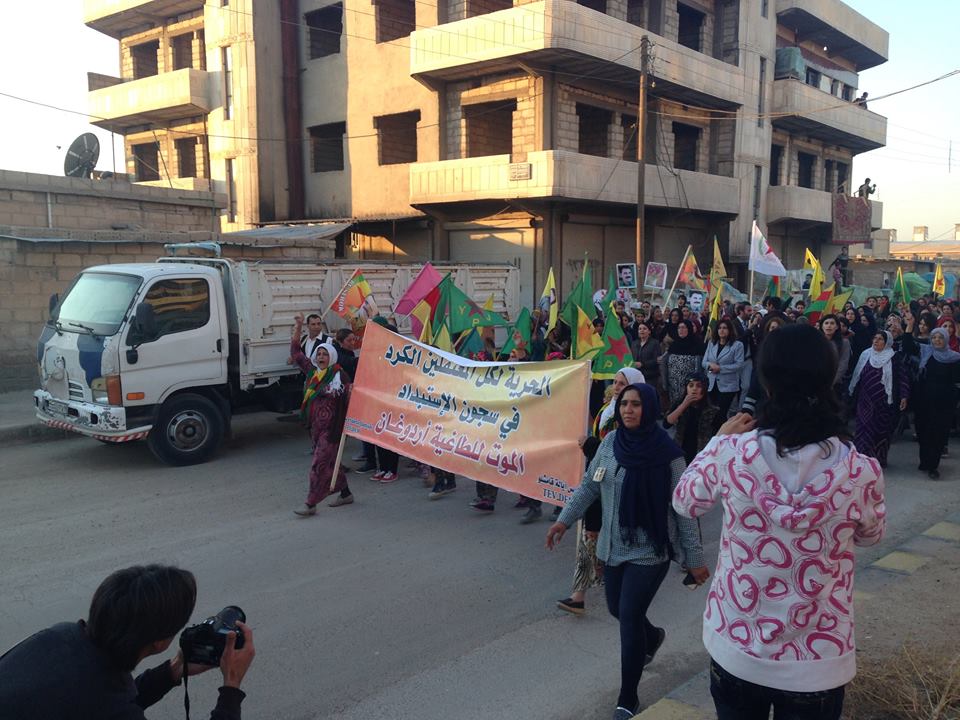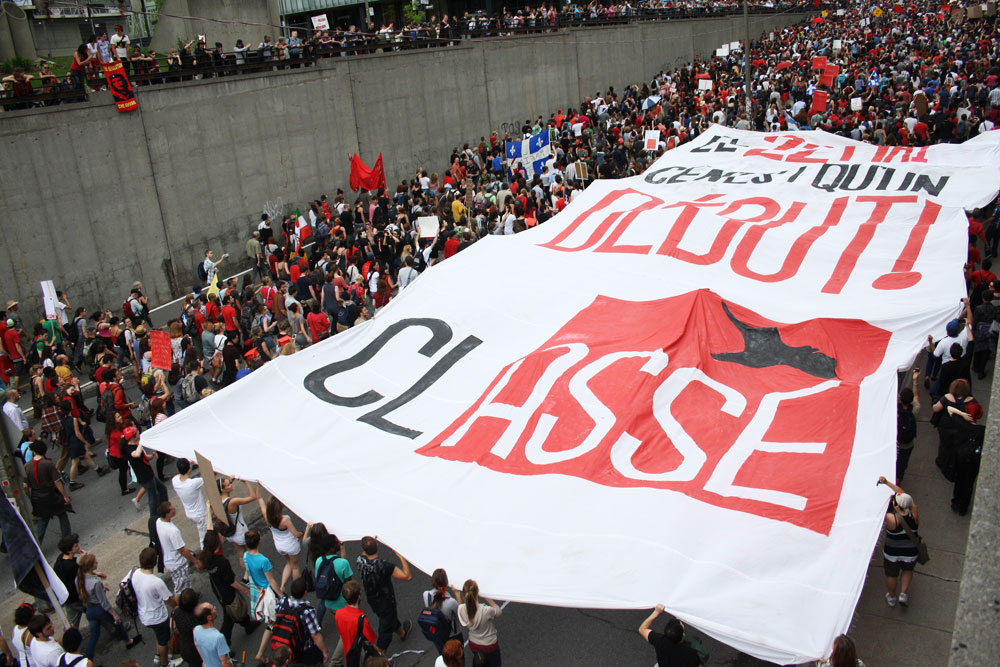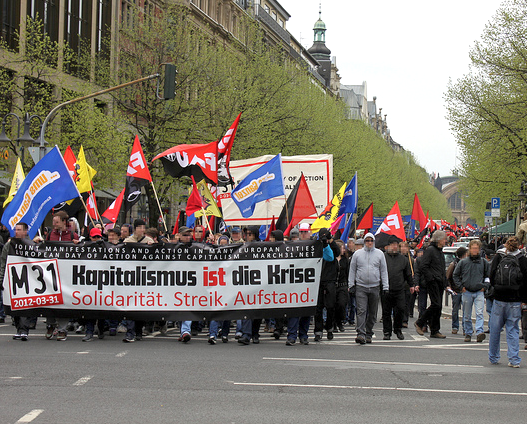Peter Loo, Rojava Solidarity Cluster
This report was originally published in December by the Red Pepper.
In 2012 the PYD, a Kurdish political party connected to the Kurdistan Worker’s Party (PKK) based in Turkey, took advantage of the spiralling chaos of the Syrian civil war to eject regime forces from large parts of Northern Syria (Rojava – West Kurdistan) and lead a social revolution. Despite being in open conflict with ISIS and Turkish-backed Syrian rebels, and under embargo from Turkey and the Kurdish Regional Government of Iraq, the PYD are leading the struggle for an ambitious series of social changes through TEV-DEM; an alliance of political and civil society organisations. These objectives are based on the ‘New Paradigm’ of the PKK and its leader, Abdullah Öcalan. Jailed for life in Turkey, Öcalan has led his party away from classical Marxism-Leninism to a set of politics with an emphasis on democratic confederalism (a decentralisation of political power with an emphasis on smaller scale assemblies), a women’s revolution, and the importance of ecology. These three elements are the official central planks of the social revolution in Rojava.
Organised in three non-continous cantons, with ISIS and Turkish backed forces separating two of them, the revolution has seen massive leaps forward in terms of women’s liberation and the spreading of the confederal model into non-Kurdish majority areas and communities. In the face of decades of under-development, and the current embargo, tentative steps have also been made to develop a more social economy through the encouragement of workers co-operatives, the development of trade unions, and the socialisation of what little industry (primarily oil) that exists. However, it should be noted that at this stage in the revolution a change in economic system is not the primary focus – contrary to what some may believe we are still using money here and private property still exists!
A revolution is not a final destination, but another step in building a society beyond capitalism, a step which, once taken, changes the responsibilities and challenges facing revolutionaries. Having overcome the Regime and achieved control of a large part of the north of Syria, the cantons are facing two sets of problems. The first are security problems; the cantons need to be physically united and solutions to the currently hostile forces in Syria, Iraq, and Turkey must be found. Simultaneously the revolution needs to be developed and deepened. Like all revolutions, this one does not enjoy universal support. Whilst large land owners and business owners are never likely to support the revolution, the members of the non-Kurdish communities in the region are slowly becoming more supportive of what is happening.
While the revolution has its roots in the Kurdish liberation movement it aims to provide a political blueprint for all the communities in Northern Syria. Since the revolution, wider and more inclusive political structures are being built here and plans are being made for the long term. Whilst the confederal model, with its layers of people’s assemblies and democratic structures, is not yet as widespread as some in the West would think, the neighbourhood assemblies which make up its lowest level, are spreading. Being only a few years old the confederal system here is looking towards the 11 years of progress that have been achieved north of the border in Bakur (Turkish occupied North Kurdistan). A large amount of emphasis is being placed on education as a tool to develop the peoples understanding and support for the revolution. The revolution initially began from within the Kurdish community but building support across the other communities that exist in the region – Arabs, Syriacs, Chechens, Armenians, etc. – is a political priority. Working with these different communities, some unsure or even critical of the revolution, to build support for the revolution is hard work and takes time.
As part of my work I am helping TEV-DEM here in Qamishlo organising around this issue. A campaign has been launched under the slogan “join your local commune. Support the confederal system” focused at the lowest levels of the confederal system, the neighbourhood communes and the mala gel (people’s houses), the assemblies and commissions which operate here feed ideas and delegates up the political system, and serve as community centres offering education and civic services. These structures are not yet as widespread as they could be and many people only use them when they have personal problems they need solving. We are running seminars and public events about the importance of the confederal model, as well as visiting different community centres, and speaking with people on the street and in their homes.
As we criss-cross the city to flyer or attend meetings, navigating a checkerboard of differing checkpoints along the way, we encounter varying levels of support for the communes and the revolution in general, often along ethnic lines. The Christian Syriac community here, for example, is divided into two: one half supporting the revolution the other half the regime. The division in the Syriac neighbourhood is clear – two security forces and two sets of competing murals and flags. As I spend more time here the regime neighbourhoods are becoming easier to spot, they are (or were pre-revolution) mainly the more upper class neighbourhoods with nicer housing and shops that even now are always full of things to buy.
The lack of many basic necessities across the revolutionary areas of Rojava is a stumbling block for many people in supporting the revolution. Whilst oil and bread are fairly abundant owing to the regime’s historic ‘development’ policies for the region, there is a lack of other basic necessities due to the embargo. Without a material improvement in people’s lives many people will not view the revolution as a successful one. A major task for the international solidarity movement must be to pressure Turkey and the Kurdish Regional Government to repeal their embargo.
The women’s movement
The women’s revolution which is well underway here also has deep roots and did not spring out of nowhere. The PKK made women’s liberation a central plank of their politics in the 1990s and the Yekîtiya Star (Star Union) in Rojava, the predecessor to Kongreya Star, had been organising women in the face of Regime repression since 2005. Beyond the massive participation of women in the YPJ and security forces, the women’s movement is achieving great things in civil society. As well as achieving legislative change, for example passing laws banning forced marriages and legalising abortion, at the grassroots level a whole series of women’s centres, educational programmes, organising groups, and newspapers and radio stations have been created. The revolution is being institutionalised through requirements for a parity of speakers and a minimum 40 per cent representation of women in all structures. Kongreya Star estimate that women’s participation rates in the commune system ranges from 50-70 per cent.
When seen in the context of the deeply conservative society upon which this revolution is being built, one in which a strictly gendered separation of social roles and violence against women was common, these developments are even more impressive. To fundamentally change this society an emphasis is being placed on education in order to empower women. Kongreya Star run weekly education sessions for their members for example, and re-education programmes exist for men who show consistent problematic behaviour.
Obviously the Rojava revolution has not emerged fully formed in spontaneous response to the horror of the Syrian conflict. It builds on the experiences and practices of other parts of the Kurdish liberation movement. Over 40 years its leading organisation, the PKK, has resisted huge amounts of state violence to develop from a small Marxist-Leninist guerilla force into become a huge hybrid movement whose extensive civic organisations are tangibly woven into the daily lives of hundreds of thousands of people. The PYD and its allies were busy in the years before the revolution began, spreading their ideas, and building the assemblies and self-defence forces which would be needed later on. Now the Regime has been evicted the organisations here are still taking a long term view: building the institutions and infrastructure needed to further develop the revolution and placing faith in education and diplomacy to communicate this political vision across the different communities.
Whilst organisers in the West might be tempted to project their dreams of a perfect, spontaneous revolution onto Rojava this isn’t the case. The revolution here is being built slowly upon long term planning, structures, and education.






